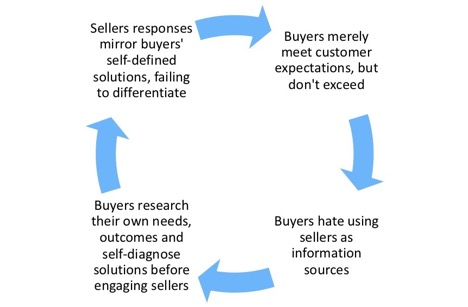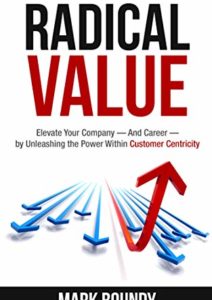What is Your Sales Reputation?
Now that you’ve closed out another quarter — possibly another year – it’s a good time to reflect. Now is a good time to ponder some big themes that will affect your, and your business results in this new year. It might be a good time to do a little self-assessment on your sales reputation. If you’re in sales, this might mean your personal reputation. If you lead a sales team or a company, it’s a good time to think about how customers think of your team and your company
The turning of a new decade reminds us that the world is changing (I know, if you’re a purist, that happens in a year, but some things are too important to put off that long). Customers are changing; their business is changing around them, and the way they buy is changing. Invest a little time right now considering those changes, and what demands change that puts on you.
This past year, I watched a few reputations change. Some for the better, some not. The thing is, the ones that improved did so because people understood the stakes, and what was required to make positive changes.
As you consider your sales reputation, here are a few questions as food for thought.
The Mediocrity Merry-go-round: Are You Riding it…Or Creating Your Own Journey?
Research has uncovered a self-defeating feedback loop that I call the mediocrity merry-go-round. It’s summarized below. Sellers don’t differentiate themselves and are therefore excluded by prospects as information resources. Customers, therefore, self-diagnose to a greater degree, and multiple salespeople from different competitors respond to customer-prepared requirements. This results in “multiple vendor presentations of the same solution”…and voila: customers are proven right that salespeople aren’t worth consulting for more than price and delivery.

If you have a sales reputation as one of those “meet, but don’t exceed expectations” sellers, you are stuck on the merry-go-round. The longer you ride it (and/or the more of your salespeople are riding it), the harder it is to hop off. Worse, you can’t differentiate. The more stuck you are on the merry-go-round, the more likely it is that you or your sales team discounts their way out of trouble rather than using your company’s differentiation.
Are You Responding to Customer RFPs or Shaping Them?
This question relates to being on the mediocrity merry-go-round but is directed at a specific marker: RFPs. If you have RFPs as a regular part of your business, you should be tracking pre-RFP engagement. Major categories might look like:
- An RFP that we didn’t know about before receipt.
- An RFP that we knew about, but didn’t know what it contained
- An RFP where we knew the contents before issuance but weren’t able to shape.
- An RFP where we had substantial input in shaping before release.
Obviously, there are many other dimensions to consider in how actively you pursue an RFP (how much discovery is allowed prior to response, for instance), but the dimension of how effectively your sales team was able to get in front of an RFP isn’t just a predictor of success, but it’s an indicator of your reputation: whether you are trusted enough to be a resource to the customer as they define their own requirements.
Those selling opportunities in which you’ve been trusted to help shape requirements are those where your reputation is what it should be. What percentage of your funnel does that last category represent?
Do You Have “Great Relationships”, or Are You a Valued Consultant?
We often hear the importance of relationships, but too few understand that “strong relationship” can mean liking: personal affinity, or trusting: credibility. One is far more important than the other; your sales reputation relies more on credibility. A seller with a reputation for insightful diagnosis of a customer’s situation and who builds personalized recommendations is going to be more successful than a seller who remembers a customer’s birthday. Some customers respond more strongly to the latter than others, but all customers appreciate the former more highly.
The research behind The Challenger Sale is just one data point that highlights the difference between the “personal affinity” side of the customer relationship and the “credibility” side. That research found that relationship-reliant personality types are not necessarily high producers, and (in a finding that combined the Challenger personality type with a credibility-building step that wasn’t covered) that forcing perspective moves the sales needle. In a real-world finding that the Challenger research missed, half of the “Challenger” personality types are low performers who challenge without having built credibility. Successfully implementing Challenger means making sure that challenger type and challenging behavior is bolstered by a credible reputation. Business acumen, customer orientation, and empathy need to accompany the challenger type, otherwise, challengers are annoying know-it-alls who harm your reputation.
Are You a Discount-happy Order-Taker or a Profitable Producer?
Believe it or not, there are actually sales organizations filled with sales professionals who take pride in the margins of their own contracts. Unfortunately, many companies build reputations for discounting their way out bad selling situations. Literally. I mean situations caused by bad selling, not bad situations that mysteriously pop up during a sale.
Worse, if your company has developed a reputation as discount-dependent, you’ll find yourself not on a merry-go-round, but on a downward spiral. Customers are easily trained to expect, then demand discounting. It’s much more difficult to train them that you have regained pricing discipline.
Worse still, companies who discount communicate, in the most convincing way possible, that their offer isn’t worth the full price. Price declares value. I’ve seen companies whose offer regularly has ROIs in the hundreds of percent discounting to “win deals”. I’ve got news: with ROIs like that, the problem isn’t the “I”: the price. It’s whether an individual customer believes they’ll achieve the promised return…and discounting only adds to the doubt.
Perhaps worst of all: What does discounting do to your internal reputation? If sales is the only department in the whole company which doesn’t seem to care about profitability, why should a sales leader expect a seat at the executive table?
Reputation Management: Analog Edition.
Internet “reputation management” is a thing, but your sales reputation isn’t something you can hire an SEO expert or a reviews manager to fix. You build a sales reputation one sales interaction at a time. Purposely, proactively, and consistently. You’re building a reputation during each customer touchpoint. Is it the one you want?
What is your sales reputation? Want to talk about it? Want to do something about it? Contact me.
To your success!
Is the “brand” of your salesforce consistent with the rest of your company’s brand promise? Do you or your sellers reinforce the value of your offer or undermine it. You may have a problem.












Comments (2)
The more customers value your offer, the more your sales reputation grows. Customer needs must be met in this modern days of doing business in order to create a valuable sales report which contributes to the overall sales reputation of a company.
Negotiations, since it is day to day learned skill and it is basic nature of this work any business would depends on this as it is what brings impressions to customers